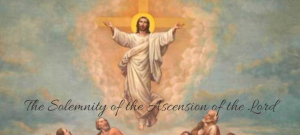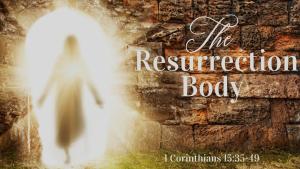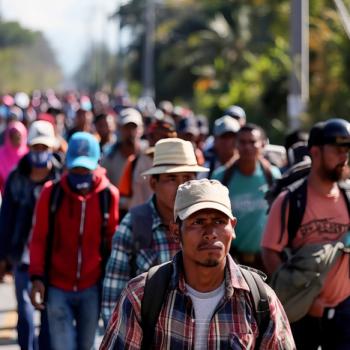
Most Catholics are aware that Ascension Thursday will occur on May 9th this year. This day marks 40 days into the Easter liturgical season, and occurs 10 days before the Feast of Pentecost. Outside of the dates and what they mean as far as the church seasons go, what is the significance of Ascension Thursday? Yes, Jesus rose to Heaven to be seated next to the Father, but what does that mean to us? Let’s take a look.
We Celebrate the Ascension
Ascension Thursday is a Holy Day of Obligation and we are required to attend Mass. This day marks the end of Jesus’ ministry on earth as he ascends to, and is seated at the right hand of the Father. Catholics believe that Jesus was divine and human. What I think is not as well known is that Jesus after His resurrection still had His body. In John 20:26-27, Jesus tells Thomas who has said he will not believe in the resurrection until he can touch His hands and side:
“Now a week later his disciples were again inside, and Thomas was with them. Jesus came, although the doors were locked, and stood in their midst and said, “Peace be with you. Then he said to Thomas, “Put your finger here and see my hands, and bring your hand and put it into my side, and do not be unbelieving, but believe.””
Did Jesus ascend into Heaven body and soul? There is some controversy about this. Obviously we don’t know for sure how we ascend into Heaven, but the Catholic Church states that:
Forty days after Jesus’ Glorious Resurrection, Our Lord ascended into Heaven (Acts 1:6-11). The Catechism of the Catholic Church (paragraph 665) says, “Christ’s Ascension marks the definitive entrance of Jesus’ humanity into God’s heavenly domain, whence he will come again (cf. Acts 1:11); this humanity in the meantime hides him from the eyes of men (cf. Col 3:3).”
We pray the Nicene Creed each week where we pray for the “resurrection of the body”, and we know that Jesus’ body and blood are present in the Eucharist, but I think the question about the resurrection of the body is best explained by Hunter Leonard:
For me, one of the most beautiful points to reflect on is that the Ascension commemorates the entrance of humanity into heavenly glory. Just as we emphasize that Jesus rose bodily from the grave, we insist that Jesus ascended bodily into heaven. I used to think of it this way: Jesus comes down to Earth at Christmas and returns to heaven at the Ascension. But the Ascension is not the undoing of the Incarnation, it is the solidifying of the Incarnation for eternity. God has a human body forever. At the Incarnation, God enters into our humanity. At the Ascension, He raises humanity up to his divinity. The early Church said it like this, the Son of God became a son of man so that sons of men might become sons of God (cf. 2 Cor 8:9). I always love to ponder how the angels reacted when seeing Jesus in his glorified body entering heaven. The shock of the Incarnation is seeing God on earth, the shock of the Ascension is seeing man in heaven.

Jesus’ Gifts From His Ascension
While this is one of the most important events in salvation history, it doesn’t always get the attention it deserves since the focus is mostly on the crucifixion and the resurrection:
- Jesus pours out His spirit on the Church by sending the Holy Spirit at Pentecost. (John 16:7-16)
- Through His suffering, the Risen Christ grants gifts of repentance and forgiveness of sins so that we may have salvation. (Acts 5:31)
- Jesus cares for His suffering people as they bear witness to Him. (Acts 7:55-56)
So when you are sitting in Mass on Ascension Thursday, please give some thought to just how important this day is for Catholics everywhere, and what it means for our own salvation. Pray to the Spirit to lead you in truth, and be open to where the Spirit takes you.
Please share any thoughts you may have on the article. Did any of this information help you to better understand the Ascension? Are there other topics you would like to see? As always, comments are not only welcome, but encouraged and I will respond to each comment.
Peace














